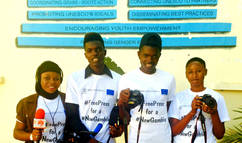Ceremony of delivery of equipment in the framework of the European Union project for media capacity building in the Gambia
On February 22nd, the European Union and UNESCO held a ceremony at the Gambia National Commission for UNESCO to deliver media equipment to beneficiary newspapers, the Gambia Press Union, and the University of the Gambia in the framework of an ongoing initiative implemented by UNESCO to reinforce the capacities of Gambian media professionals. This project is part of a wider Governance Programme of 10 million euro (approximately equivalent to 500 million dalasi) financed by the European Union in the country, which includes several components such as: (i) Access to Justice and Legal Education, (ii) Journalism and Media, and (iii) Public Financial Management.
The project Journalism and Media of the EU's Governance Programme is contributing with 691,583 euro (approximately equivalent to 35 million dalasi) to the media reform in The Gambia. No other sector than the media has the outreach capacity for reaching decision makers and the general public. The overall objective of this project is therefore to contribute to better democratic governance through improving freedom of the press and the quality of information available to the population.
This project promotes excellence in journalism, and innovative curricula, as supporting journalism education is an important part of developing a free and independent media. The project also reinforces gender equality in the media through the selection of target groups for the training activities, and the development of training curricula and materials. It also directly contributes to enhancing human rights in the country, as the media have a tremendous power to influence a nation's political discourse, and a free and open media is essential to a healthy democracy.
In the Republic of The Gambia, as in many countries around the world, media professionals often lack the necessary resources and capacities to exercise their activities. Difficulty accessing information and lack of equipment and training are among the daily challenges faced by media professionals. This project is therefore addressing some of these issues, namely professional development and training, as well as gender inequality in media, and the economic viability of media houses.
Primary beneficiaries of this project include media houses, newspapers, community radios, the Gambia Press Union, and the University of the Gambia. Through June 2017, capacity building initiatives will occur, as well as training of Gambian security forces on the safety of journalists and freedom of expression to support the UN Plan of Action on the Safety of Journalists and the Issue of Impunity. Furthermore, and in light of recent changes in Government, a formal platform for dialogue between media and the Government will be established in order to support the revision of existing regulatory frameworks concerning freedom of expression and access to information.
UNESCO has been identified for the implementation of this project as this UN agency has a neutral mandate to support the fields of communication, media, and journalism, and a longstanding experience in capacity building of media professionals to meet international standards.
This project is implemented in the framework of UNESCO's International Programme for the Development of Communication (IPDC). The IPDC is the only multilateral forum in the UN system designed to mobilize the international community to discuss and promote media development in developing countries. The Programme not only provides support for media projects but also seeks an accord to secure a healthy environment for the growth of free and pluralistic media in developing countries. The efforts of the IPDC have had an important impact on a broad range of fields covering, among others, the promotion of media independence and pluralism, development of community media, radio and television organizations, modernization of national and regional news agencies, and training of media professionals. The IPDC strives to implement effective media projects that empower people to gain equitable access to knowledge and express themselves through free and pluralistic media.
For further information, please contact Sasha Rubel Diamanka: s.rubel(at)unesco.org
<- Back to: News articles

